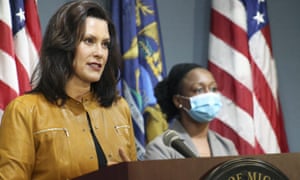Swing states become partisan battlegrounds in America’s fight against Covid-19
States such as Michigan and Wisconsin helped bring Donald Trump to power in 2016. How they handle the pandemic may well be crucial this November too

Photograph: Mark Makela/Getty Images
They were the battleground states that handed the White House keys to Donald Trump by a whisker. Now they are the battleground states of the coronavirus pandemic, microcosms of a crisis that, far from bringing America together, threatens to tear it apart.
Michigan, Pennsylvania and Wisconsin formed the blue wall that crumbled in 2016 as Hillary Clinton lost them by a combined total of fewer than 80,000 votes (0.06% of 137m votes cast). Each is led by a Democratic governor whose lockdown orders, while mitigating the spread of the virus, could shape the US president’s race with Joe Biden in 2020.
“We have to get your governor of Pennsylvania to start opening up a little bit,” Trump told workers at a medical supply distribution hub in Allentown this week. “You have areas of Pennsylvania that are barely affected, and they want to keep them closed. Can’t do that.”
On Friday, hundreds of demonstrators descended on Pennsylvania’s state capitol in Harrisburg to protest the stay-at-home order from Governor Tom Wolf. Pennsylvania ranks 12th among states in Covid-19 cases per capita, according to a Reuters tally.
In Wisconsin, meanwhile, the state supreme court’s conservative majority this week struck down a stay-at-home order extension issued by Governor Tony Evers. “We’re the Wild West,” he said despairingly. Trump was quick to describe it as a “win” over the “Democrat Governor”, tweeting: “The people want to get on with their lives. The place is bustling!” Indeed, photos of crowded bars quickly appeared on social media.
Following Wisconsin’s lead, on Friday Republicans who control the state legislature in Michigan urged a judge to strike down stay-at-home orders and restrictions on businesses imposed by Governor Gretchen Whitmer. Republicans complain that her approach is overly cautious, particularly in areas that have not been hit as hard with the virus as the Detroit area, which has two thirds of the state’s cases.
Armed protesters, some with Confederate flags and Trump regalia, have gathered at the Michigan state capitol in Lansing over the past three weeks. On Thursday a legislative session was cancelled to avoid a repeat of a recent incident in which gun-toting demonstrators crowded inside the building.
Clinton tweeted: “Armed men storming a legislature to disrupt its democratic proceedings is domestic terrorism. It cannot be tolerated.” A man was charged with terrorism, accused of death threats against Whitmer.
The protesters have been endorsed by Trump, who at one point tweeted “Liberate Michigan”, guaranteeing outsized media exposure despite polls showing a majority in favour of restrictions on businesses, schools and social gatherings, despite mass job losses.
Neil Sroka, a city council member in Grosse Pointe Farms, Michigan, said: “Frankly, the right wing agitators that were trying to pull a stunt with these protests really put their foot in their mouth by having folks marching around with weapons.
“Everyone is frustrated at being cooped up in their house, and certainly the weather here in Michigan hasn’t helped, but those folks that were protesting in the capitol do not reflect the views of anywhere close to a majority of people in my community and Michiganders in general.”
Sroka, who is also spokesperson for the progressive group Democracy for America, said partisan divisions over the issue are beginning to emerge, though they remain relatively modest. But he was “shocked” by this week’s events across Lake Michigan in Wisconsin.
“Experiencing the deaths that we have here in the Detroit area and then seeing pictures from people crowding into bars over the last couple of days is just horrifying,” he continued. “You can’t be here in Wayne County, Michigan, and not feel the aura of death. Seeing the crowds in a place like Wisconsin just hours after the ban was lifted, there is a real disjointedness and a sense that parts of America may not understand what it’s like to be living through this.”
Wisconsin had already stunned observers last month when Evers was again overruled by Republicans who forced a primary election to go ahead, leaving people in face masks to line up for hours to cast ballots. Critics described it as a chilling consequence of aggressive gerrymandering, which all but guarantees Republicans a legislative majority.
Ed Fallone, a Marquette University Law School professor who unsuccessfully ran for the Wisconsin supreme court as a Democrat, said: “We’ve had two Wisconsin supreme court decisions that undermine the Democratic governor’s authority and now it’s fully expected that even local jurisdictions that have in place countywide or citywide stay-at-home orders will have litigation brought against them. It’s pretty much Democrat versus Republican, top-to-bottom.”
Reports suggest that the pandemic has been sucked into America’s political polarisation and culture wars.
Many protesters, taking their lead from Trump, refuse to wear face masks or maintain physical distance. “Science is no match for tribalism in this dysfunctional country,” wrote Frank Bruni, a New York Times columnist. “And protective masks, God help us, are tribal totems.”
Fallone has seen evidence of the trend in Wisconsin. “I’m on various political Facebook groups throughout Wisconsin and you can see on social media the difference between people who react when they run into folks who aren’t wearing face masks and who are upset about it, and then other folks who are mocking anyone who tries to social distance,” he said.

“It’s become very political. People take their cues from their leaders and so, on the Republican side, people are taking their cues from the Trump administration and the state Republican party leaders who are consistently talking about freedom and liberty and go where you want, do what you want. And on the Democrat side, people are trying to follow the governor’s recommendations and engage in social distancing and wear face masks.”
Confirmed coronavirus cases in Michigan crossed 50,000 while Covid-19 deaths rose slightly to 4,825, the state health department said on Friday. More than 11,000 cases had been identified in Wisconsin as of Thursday night, according to a New York Times database, and at least 434 people had died. More than 63,000 cases had been identified in Pennsylvania as of Thursday night, along with about 4,300 deaths, the Times reported.
Just as in the 2016, the swing states bring national trends into sharp focus. Democratic governors across the country have generally urged caution, particularly in major cities, citing concerns for public health from a virus that has killed more than 85,000 people in the US – more than any other country in the world.
But Republican governors have tended to err on the side of reopening faster, alarmed that more than 36m Americans have submitted unemployment claims since mid-March and retail sales dipped 16.4% last month. Southern states such as Georgia and Texas were among the first to allow shops and businesses to reopen.
“Vaccine or no vaccine, we’re back,” Trump said in the White House rose garden on Friday while announcing a major US drive to create a coronavirus vaccine.
Polls show Biden beating Trump in battleground states but Wendy Schiller, a political science professor at Brown University in Providence, Rhode Island, warns that he still faces political traps.
“The fundamental problem for the Democratic party is that in order to defeat Trump, they almost have to cheerlead for a bad economy and they also have to cheerlead for new [coronavirus] hotspots in swing states. It sounds gruesome, but really that’s so far what they’re banking on to beat Trump.
“And in this case, Trump is absolutely smarter than that and what he is offering, not only his base but voters in swing states, is hope. It’d actually be reminiscent, in a much less articulate way, of Ronald Reagan. He’s basically saying, ‘I got you to the promised land economically once, I will get you back to the promised land economically again’.
Schiller added: “Trump will run on a message of hope from now until November, and he’ll basically dare the Democrats to prove him wrong. And then he’ll say, ‘You don’t believe in America. You’re betting against America.’
“It’s a very interesting corner that he’s boxing the Democrats into and I think they’re hoping that people realise that the mismanagement of messaging on Covid and additional things like tariffs against China and supply chains undermine Trump, but those are very sophisticated arguments to make. When the Democrats have to make sophisticated arguments, the Democrats lose. The good news for the Democrats, the only saving grace, is that Joe Biden can speak swing state language.”




